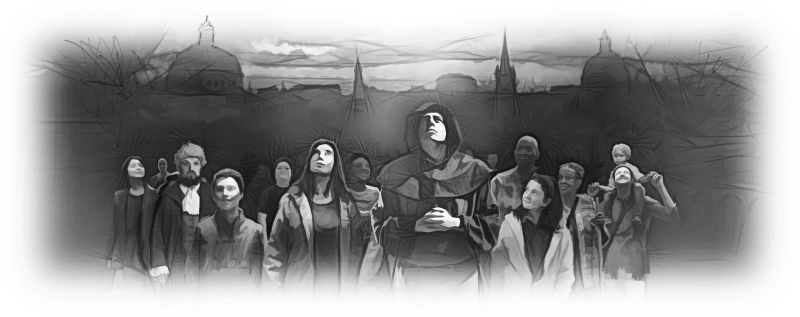Read Daniel 7:23–25 and Revelation 12:6, 14. What prophetic time periods are referred to in these passages?
Whenever God’s people remain faithful to Him, Satan is enraged. Persecution often follows. The prophet Daniel described a time, still future to him, when the medieval church would “make war against” and “persecute” God’s people (Dan. 7:21, 25, NKJV). The prophet John described this same period as a time when God’s church would be forced to flee into the wilderness, where she would be “nourished for a time and times and half a time” (Rev. 12:14, NKJV). Revelation 12:6 adds, “The woman [the church] fled into the wilderness where she has a place prepared by God” (NKJV). God’s people were nourished in the wilderness. His Word strengthened and sustained them as the great controversy raged on during this long and dark period of papal domination.
God’s people found a “place prepared” for them by God. In life’s greatest challenges, God always prepares a place for His faithful followers. During the times of their greatest trial, His people have found refuge in His love and care. (See Psalm 46.)
The 1,260 days and the time, times, and half a time in Revelation 12:6, 14 are both referring to the same period (3½ times or years x 360 days per year = 1,260 days). Biblical prophecy is often written in symbols. In the prophetic portions of Daniel and Revelation, one prophetic day equals one literal year. We find this day-year principle in Numbers 14:34 and Ezekiel 4:6.
The day-year principle rests not on these two texts only, but on a broad scriptural foundation. William Shea, chronologist and Old Testament scholar, gives twenty-three lines of biblical evidence throughout the Old Testament for this principle. Bible interpreters have used it throughout the centuries.
The Visigoths, Vandals, and Ostrogoths were tribes that believed doctrines differently than Rome’s official teaching. The 1,260 days began when the last of these barbarian tribes, the Ostrogoths, were driven out of Rome in A.D. 538. This period of spiritual darkness continued until A.D. 1798, when the Napolean’s general Berthier removed the pope from Rome. Countless Christians were martyred during this long period because they obeyed the Word of God. Even in death, they triumphed. In Christ they were free from the guilt and the dominion of sin, overcoming “through the blood of the Lamb.” Christ’s victory over Satan on the cross was their victory. Though they died, their death is only a rest until the return of Christ.
How has fulfilled Bible prophecy strengthened your faith?
Additional Reading: Selected Quotes from Ellen G. White
In the sixth century the Papacy had become firmly established. Its seat of power was fixed in the imperial city, and the Bishop of Rome was declared to be the head over the entire church. . . . And now began the 1260 years of papal oppression foretold in the prophecies of Daniel and John. (Daniel 7:25; Revelation 13:5-7.) Christians were forced to choose, either to yield their integrity and accept the papal ceremonies and worship, or to wear away their lives in dungeon cells, or suffer death by the rack, the fagot, or the headsman’s ax.
Now were fulfilled the words of Jesus, “Ye shall be betrayed both by parents, and brethren, and kinsfolks, and friends; and some of you shall they cause to be put to death. And ye shall be hated of all men for My name’s sake.” Luke 21:16, 17. Persecution opened upon the faithful with greater fury than ever before, and the world became a vast battlefield. For hundreds of years the church of Christ found refuge in seclusion and obscurity. Thus says the prophet: “The woman fled into the wilderness, where she hath a place prepared of God, that they should feed her there a thousand two hundred and threescore days.” Revelation 12:6.—The Story of Redemption, p. 330.
More than eighteen centuries have passed since the apostles rested from their labors, but the history of their toils and sacrifices for Christ’s sake is still among the most precious treasures of the church. This history, written under the direction of the Holy Spirit, was recorded in order that by it the followers of Christ in every age might be impelled to greater zeal and earnestness in the cause of the Saviour. . . .
Not in their own power did the apostles accomplish their mission, but in the power of the living God. Their work was not easy. The opening labors of the Christian church were attended by hardship and bitter grief. In their work the disciples constantly encountered privation, calumny, and persecution; but they counted not their lives dear unto themselves and rejoiced that they were called to suffer for Christ. Irresolution, indecision, weakness of purpose, found no place in their efforts. They were willing to spend and be spent. The consciousness of the responsibility resting on them purified and enriched their experience, and the grace of heaven was revealed in the conquests they achieved for Christ.—The Acts of the Apostles, pp. 593, 595.
We are standing on the threshold of great and solemn events. Prophecy is fast fulfilling. The Lord is at the door. . . . A crisis is just upon us.
But God’s servants are not to trust to themselves in this great emergency. In the visions given to Isaiah, to Ezekiel, and to John we see how closely heaven is connected with the events taking place upon the earth and how great is the care of God for those who are loyal to Him. The world is not without a ruler. The program of coming events is in the hands of the Lord. The Majesty of heaven has the destiny of nations, as well as the concerns of His church, in His own charge.—Testimonies for the Church, vol. 5, p. 753.
